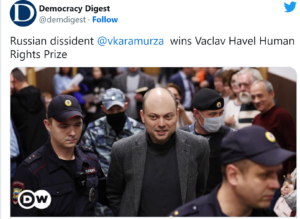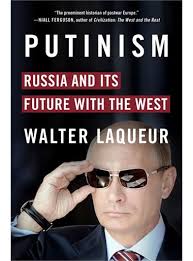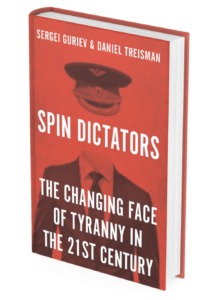Inside the Moscow courtroom where judges have just rejected Vladimir Kara-Murza’s appeal against his 25 year prison sentence. The Kremlin critic was convicted of treason in April. pic.twitter.com/i1ljaoY3V0
— Steve Rosenberg (@BBCSteveR) July 31, 2023
Russian opposition politician Vladimir Kara-Murza on Monday lost an appeal against his 25-year jail sentence, Reuters reports. Kara-Murza, who holds Russian and British citizenship, was jailed for 25 years in April for treason and spreading “false information” about Russia’s war in Ukraine.
In his last words in court in April, Kara-Murza stood by his political work, including his comments on the offensive in Ukraine, AP adds.
 “Not only do I not repent for any of it — I am proud of it,” he said.
“Not only do I not repent for any of it — I am proud of it,” he said.
Britain today sanctioned the judges and officials involved in the trial, Reuters reports. Moscow City Court Judges Vitaly Belitsky, Ekaterina Mikhailovna Dorokhina and Natalia Nikolaevna Dudar were among those added to the sanctions list. Britain has previously sanctioned some of those connected to the case.
Anti-war sociologist and Marxist theorist Boris Kagarlitsky has been detained on charges of “justifying terrorism” that could see him sentenced to up to seven years in prison, The Moscow Times reports.
Hardline elements within Russia’s military and security services already feel betrayed by Putin’s management of the war, notes Maksym Skrypchenko, president of the Transatlantic Dialogue Center. Putin may find that his heavy-handed efforts to keep a lid on dissent have the unintended effect of galvanizing threats to his power, he writes for The Hill.
“Our misreading of Russia is deep. Very deep,” says Yale historian Tim Snyder.
For Snyder, the west’s lack of historical clarity on Russia has been a deadly mistake, and continues to be at the core of our misreading of Putin. He decries our ongoing focus on “pragmatic” solutions to the conflict, and a conceptualizing of Putin as some kind of cynical, but ultimately relatable, power politician in the western mold, The Financial Times reports:
 Putin’s radical ideas have been catastrophically minimized …. “Ideas, it turns out, matter. Until far too recently [western] policy discussions about Putin were shaped by our own ideas about technocracy and pragmatism and stability — categories which I think have already worn out their welcome.”…..
Putin’s radical ideas have been catastrophically minimized …. “Ideas, it turns out, matter. Until far too recently [western] policy discussions about Putin were shaped by our own ideas about technocracy and pragmatism and stability — categories which I think have already worn out their welcome.”…..
Putin’s ideas have been gestating for a much longer period; we were just blind to them. “When Putin returned to the office of the presidency [in 2012] you could see in his Russian-language proclamations, radio interviews and in print, a clear worldview, which is essentially the world view that has become more familiar to us since February 2022, according to which it’s not about states, it’s about civilizations; it’s not about interests, it’s about missions.”
Except that some observers, including the late historian Walter Laqueur, did draw attention to Putinism’s ideological underpinnings.
In April 2022, economist Sergei Guriev and political scientist Daniel Treisman published a book titled Spin Dictators: The Changing Face of Tyranny in the 21st Century focused on modern autocracies and what they call “spin dictatorships,” which base their authority on manipulation and propaganda, Meduza reports.
 A “fear dictatorship” like Putin’s won’t necessarily last forever, Treisman tells Meduza. “Repression can be very effective in the short run, but it leaves you with […] problems, with economic challenges […] and the internal difficulties, domestic policy dead ends, that one started with.”
A “fear dictatorship” like Putin’s won’t necessarily last forever, Treisman tells Meduza. “Repression can be very effective in the short run, but it leaves you with […] problems, with economic challenges […] and the internal difficulties, domestic policy dead ends, that one started with.”
When the war ends, Russia will face at its borders two militarily committed, capable neighbors facing a common enemy, René Nyberg writes for Carnegie Politika. Poland and Ukraine are bound together more strongly than at any other time in history.
For the last year and a half, foreign businesses have been gradually leaving Russia and suffering losses, offering huge discounts to new owners and paying contributions to the Russian budget, Sergey Teplyakov writes exclusively for Novaya Gazeta Europe. But it seems that this is not the limit: Russian authorities have recently changed their strategy and started “temporarily” nationalising the property of Western investors. Novaya-Europe explains how businessmen close to the Kremlin gained control over Danone and Carlsberg and how much they will earn from the new assets.
How did the Kremlin gain control over Danone and Carlsberg? And who benefited the most from it?
Novaya-Europe looks into the nationalisation of foreign assets in Russia
1/7https://t.co/pBGIAioE3u
— Novaya Gazeta Europe (@novayagazeta_en) July 31, 2023







